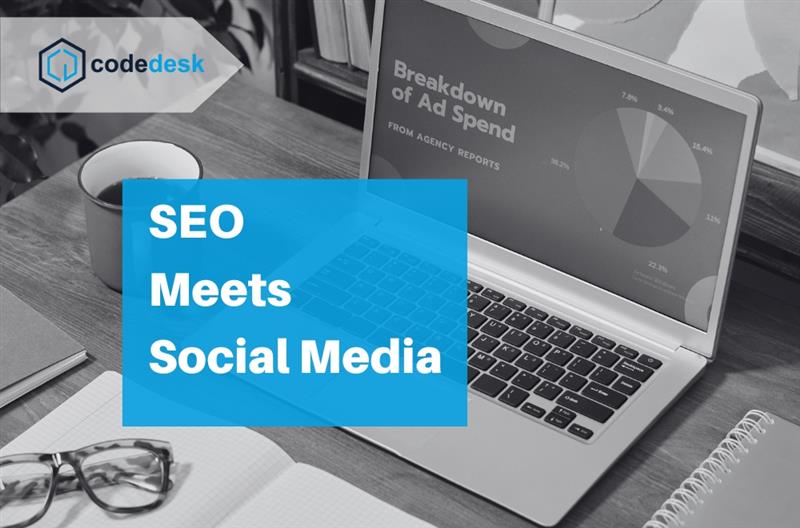In the ever-evolving digital landscape, Social Media and SEO are two pillars that support a brand’s online presence. While they may seem like separate strategies, when combined effectively, they work together to drive traffic, boost engagement, and improve search rankings. If you’re looking to harness the power of both, you’re in the right place!
Does Social Media Affect SEO?
The short answer is yes—but indirectly. Google has stated that social signals (likes, shares, followers) are not direct ranking factors. However, social media influences SEO in multiple indirect ways:
- Increased Visibility & Traffic – Content that goes viral on social media attracts more clicks and visits to your website.
- Longer Dwell Time – A well-crafted post leading to an engaging blog keeps users on your site longer, a positive SEO signal.
- More Backlinks – Great content shared widely has a higher chance of being linked to by other websites, improving domain authority.
- Improved Brand Authority – A strong social media presence enhances credibility, encouraging trust from users and search engines alike.
- Faster Indexing – Search engines crawl pages faster when they gain traction on social platforms.
Now that we understand the connection, let’s explore how to integrate social media into your SEO strategy effectively.
1. Search Optimize Your Social Media Profiles
Your social media profiles are search engines unto themselves. People do, in fact, search for businesses on Facebook, Twitter, and LinkedIn. Get your brand in front of the searchers by search optimizing your profiles with:
- Using keywords that apply to your bio and descriptions.
- Making your brand name identical across all profiles.
- Including a link to your site in your profile and updates.
- Adding good-quality images and a professional logo to establish trust.
2. Share High-Quality, Shareable Content
Content is the foundation of both social media and SEO. The more valuable your content, the greater the likelihood of it being shared, linked, and ranked. Here’s what you should prioritize:
- Informative Blog Posts – Answer typical industry-related questions and provide solutions.
- Infographics & Visual Content – Users enjoy sharing good-looking data.
- Video Content – Video content gets more engagement and increases time spent on pages.
- Interactive Polls & Surveys – Engage users while collecting insights.
- User-Generated Content (UGC) – Highlight customer reviews, testimonials, and success stories.
Remember: Engagement = More Reach = More SEO Benefits.
3. Use Social Media for Link Building
Backlinks are still an important ranking factor, and social media can help you obtain them naturally. Here’s the way to do it:
- Network with Influencers – Get your content shared by reliable names in your niche.
- Participate in Relevant Communities – Join Quora, Reddit, and niche forums to gain credibility.
- Share Content on LinkedIn – Experts and bloggers tend to quote LinkedIn articles.
- Instill Social Sharing – Add share buttons on your website and blogs.
The more your content is shared, the greater the chances of receiving natural backlinks from high-authority websites.
4. Make Social Media Increase Brand Searches
Increased brand searches are one of the largest advantages of social media for SEO. When individuals search for your brand on Google directly, it is an indicator that sends good signals about your credibility.
- Run Facebook and Instagram brand awareness campaigns.
- Treat your social pages to consistent brand and messaging optimization.
- Make existing customers recommend you online.
- Incorporate keywords and trends so that your brand is more accessible.
More brands searched = Greater SEO rankings.
5. Measure & Analyze Performance
Make sure that whatever you’re doing is actually reaping rewards with regular monitoring and optimization of social media and SEO efforts.
- Google Analytics – Keep an eye on website traffic driving from social networks.
- Facebook Insights & Twitter Analytics – Track engagement and referral traffic.
- SEMrush & Ahrefs – Backlink analysis and keyword rankings
- Social Listening Tools – Monitor brand mentions online.
Upon analyzing the data, you can tweak your strategy and concentrate on what is working best.
6. Social Media and Local SEO
If you have a local business, social media can play a huge part in improving your Local SEO rankings.
- Improve your Google My Business (GMB) profile and regularly post updates.
- Share location-based content on Facebook and Instagram.
- Request customer reviews on Google and social media.
- Join local events and add your location tag.
- Having a robust social presence can boost foot traffic and gain visibility in local searches.
7. The Future of Social Media and SEO
As AI and changing algorithms rise, the marriage of social media and SEO will continue to grow. Keep an eye out for these things:
- Voice Search Optimization – The more people use voice search, the more optimizing social content for conversational terms is needed.
- Short-Form Video Content – TikTok and Instagram Reels are driving massive engagement.
- AI-Powered SEO & Social Ads – Smarter automation tools are helping brands reach their maximum potential.
- Social Commerce Growth – More users are buying directly from social platforms.
To remain in the lead, companies need to keep changing their strategies and tap into both social media and SEO at the same time.
Final Thoughts: The Power of an Integrated Approach
Social media and SEO are not competitors; they are partners in digital success. When combined, they help you:
- Increase brand visibility.
- Drive high-quality traffic.
- Boost engagement and conversions.
- Improve search engine rankings.
The key is consistency. Keep sharing, optimizing, and engaging, and watch your brand rise in search rankings and social influence.
Conclusion: The Potential of a Unified Approach
Social media and SEO are not rivals; they are allies in online success. When used together, they assist you:
- Boost brand visibility.
- Generate high-quality traffic.
- Increase engagement and conversions.
- Enhance search engine rankings.
The secret is consistency. Share, optimize, and engage repeatedly, and observe your brand increasing in search rankings and social authority.
What’s Next?
If you haven’t already, start integrating social media and SEO into your marketing strategy today. The results won’t be instant, but over time, you’ll see significant improvements in traffic, engagement, and brand authority.
Need help with your Social Media and SEO strategy? Let’s click on https://code-desk.com/ for BEST services.




